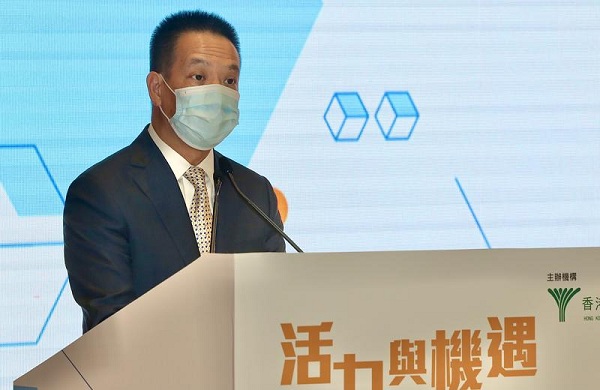Huang: HK youth to receive full-scale support in Bay Area

Huang Liuquan, deputy director of the Hong Kong and Macao Affairs Office of the State Council, speaks to youth representatives at the Open University of Hong Kong on Aug 25, 2021. [PHOTO PROVIDED TO CHINA DAILY]
Huang Liuquan, deputy head of the Hong Kong and Macao Affairs Office of the State Council, on Wednesday said the nation will roll out more policies and resources to support Hong Kong youth in seeking development in the Guangdong-Hong Kong-Macao Greater Bay Area.
The all-around measures include pushing for more incubation bases for startups in Qianhai of Shenzhen and Guangzhou's Nansha, as well as providing more internships for Hong Kong and Macao youngsters.
In the future, Hong Kong's Chinese medicine practitioners will also be allowed to practice in public hospitals and medical organizations within the Bay Area. Lawyers from the city will be able to practice on the Chinese mainland after passing a test.
To introduce these policies, Huang led a team of central government officials in charge of the economy, finance, and technology to meet with the city's youth at the Open University of Hong Kong. The two-hour seminar was broadcast online. The officials elaborated on the development opportunities brought to Hong Kong by the nation's 14th Five-Year Plan and the Bay Area.
The event was the last of four seminars held between the central government delegation and local officials and community, which started Monday.
The delegates earlier met with SAR government officials, civil servants and legislators, as well as representatives from local business and professional sectors.
Also addressing the seminar, Secretary for Home Affairs Caspar Tsui Ying-wai revealed the Hong Kong government would also expand various youth exchange and internship programs.
Tsui said the 14th Five-Year Plan was proposed to further facilitate young people from Hong Kong and Macao to study, work and start businesses in mainland cities in the Greater Bay Area, reflecting the nation's care for young people from the SARs.
The SAR government will continue to push for policies and measures in various sectors to actively join the construction of the Bay Area, Tsui said, urging the city's youth not to miss out.
Many young people from Hong Kong have made forays into the Bay Area, breaking new ground for their dream, Huang said, noting over a thousand youngsters from Hong Kong and Macao are now exploring their careers through 765 startup projects made for them.
Some eyed the modern agriculture industry in Dongguan, while others started coffee brands and opened up outlets, he explained.
These cases show realizing one's dream is not a far-off thing, Huang said.
Hong Kong youngsters, with language advantages and international vision, are sure to gain a distinctive advantage in the Bay Area, he said, encouraging them to follow their predecessors to seize the opportunities brought by the nation's rapid development.
Li Xiao, deputy director-general of the China Science and Technology Exchange Center, told the Hong Kong youths "not to hesitate" to participate in 14th Five-Year Plan-related projects. He hoped they would understand the whole of the rapidly developing mainland is a huge stage for them to showcase their strengths.
Clarence Ling, chairman of the Y.Elites Association and an attendee of Wednesday's meeting, said he felt inspired by the speeches. Hong Kong youths should take the chance to "step out of their comfort zone" in the changing situation, Ling said.



 Print
Print Mail
Mail

